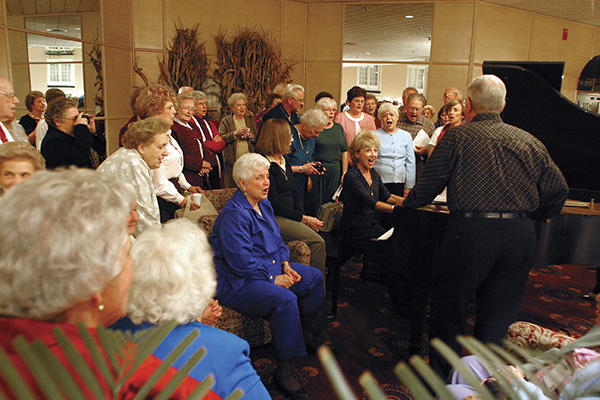When geropsychologist Benjamin Mast evaluates dementia clients at his University of Louisville research lab, there’s a question some people of faith ask:
“What if I forget about God?”
It’s a query that reflects the struggles of people facing diseases like Alzheimer’s.
In his book, “Second Forgetting: Remembering the Power of the Gospel During Alzheimer’s Disease,” Mast describes a man who may not always remember his grown children’s names but “quickly joins in” when someone reads one of his favorite psalms.
‘Magical moments’
Mast said what remains intact is the part of the memory that’s held longest. In some cases that relates to faith: hymns and creeds that people may have recited for years.
“If you ask a person who’s been deeply affected by Alzheimer’s about something that happened yesterday, you’re going to their weakness in terms of memory,” he said.
“But if we can engage them, for example, in the context of faith services with older songs and hymns that they’ve known for many years, we’re meeting them where they’re strong.”
In congregations and chaplains’ offices there are stories of faith kept and questions about whether it has been lost. Experts and everyday individuals speak of “magical” moments, when people who usually stare into space are suddenly enlivened by worship, and tough times, when a loved one no longer avows a long-term belief.
Mast, a Southern Baptist elder, said clergy have often told him they grapple with how to help congregants whose families are coping with dementia.
“The common refrain is, ‘Seminary didn’t prepare me for this,’” Mast said.
He succeeded in having Southern Baptists adopt a 2016 resolution that called for pastors to seek training about Alzheimer’s and other forms of dementia and churches to expand their ministries to meet needs of caregivers and the people for whom they are providing care.
The U.S. Centers for Disease Control and Prevention estimates that more than 5.7 million Americans have Alzheimer’s. Experts predict twice as many Americans 65 and older will have the disease by 2040.
Chaplains in senior citizens’ facilities have long dealt with residents with dementia and have noticed how some residents may recall their religion more than other aspects of their lives.
“They will remember how to say the Lord’s Prayer when they won’t remember anyone’s name. They’ll remember the words to ‘Amazing Grace’ when they don’t know what day it is,” said Rebecca Church, director of pastoral services at a United Methodist-affiliated retirement community in Louisville.
Some churches have found that special worship services may meet a need when a longtime congregant can no longer manage the typical sermons and contemporary music that may be heard in a sanctuary.
Church memories
Jane Gumbiner, a member of Southeast Christian Church, a megachurch in Louisville, tears up when she speaks of how nice it is to hear her husband, Hal, sing at its “Classic Worship” service on Thursdays. She relishes the moments when his memory of church appears three and a half years after his diagnosis with dementia.
The Thursday gathering allows the retired veterinarian to sing “old-timey hymns” like “The Old Rugged Cross” and “I Surrender All.”
“He sings them, he knows them,” said the retired educator who wears a pendant with a fish next to her cross to underline her faith. She adds more softly: “As opposed to just being totally silent.” (RNS)
_____________________________________________________________________________
How to help, not hurt, congregants with dementia
When a congregant has dementia, what can a church do?
Though each person is different and advice varies depending on an individual’s condition, here are some basic tips from experts.
Congregations
- Visit people in homes or at care facilities
- Offer respite to caregivers
- Create support group or help families connect with established ones locally
- Host a hymn singing and recite traditional prayers
- Use name tags
- Don’t exclude (create accommodations instead)
Individuals
- Treat people with respect
- Reintroduce yourself
- Sing, create a playlist of favorite hymns and songs
- Listen
- Phone caregivers
- Don’t ask “Do you remember me?”
- Don’t be condescending (treat like adults, not children)
- Don’t try to correct (accept their reality)
- Don’t ask about recent activities
(Faith United Against Alzheimer’s, RNS)
To read more, visit https://thealabamabaptist.org/worship-leader-s…-his-grandmother/






Share with others: